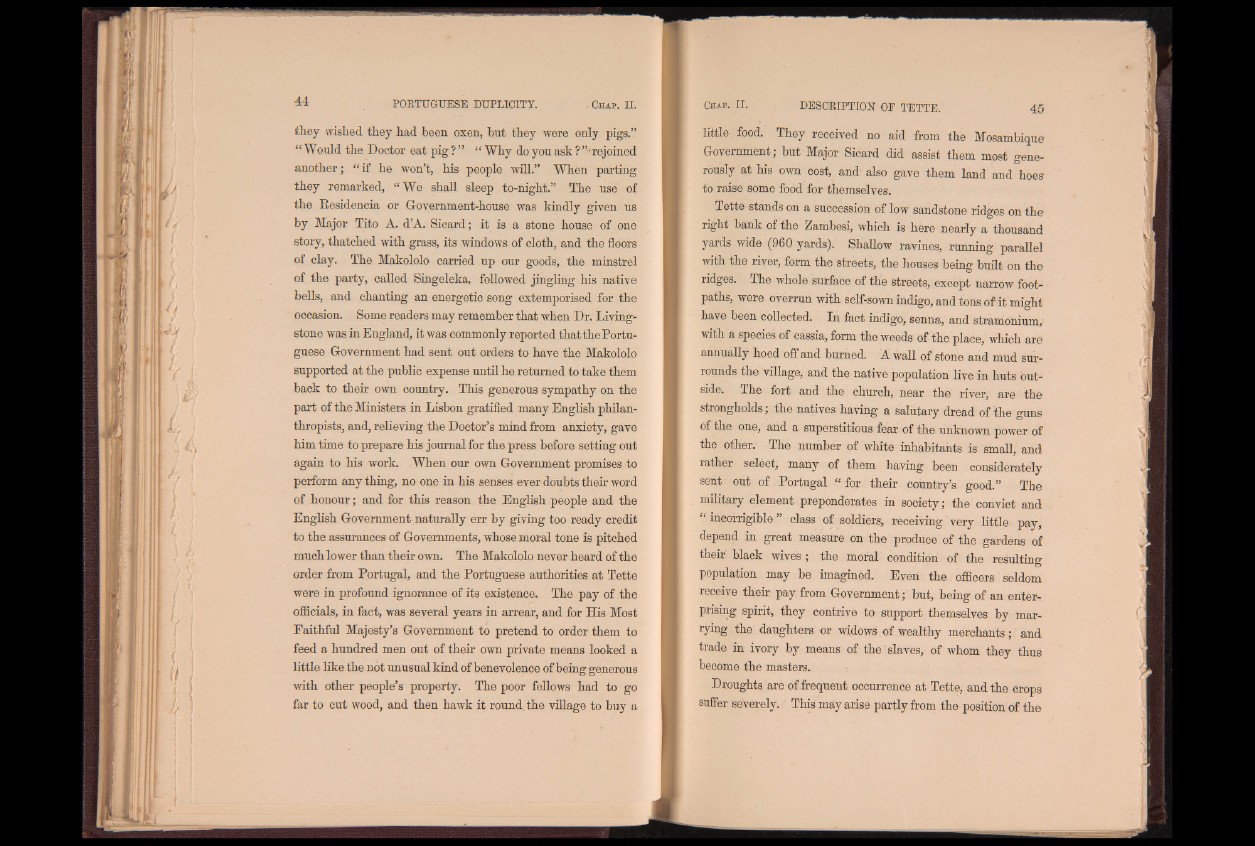
they wished they had been oxen, hut they were only pigs.”
“Would the Doctor eat pig ? ” “ Why do you ask ? ”■ rejoined
another; “ if he won’t, his people will.” When parting
they remarked, “We shall sleep to-night.” The use of
the Residencia or Government-house was kindly given us
by Major Tito A. d’A. Sicard; it is a stone house of one
story, thatched with grass, its windows of cloth, and the floors
of clay. The Makololo carried up our goods, the minstrel
of the party, called Singeleka, followed jingling his native
bells, and chanting an energetic song extemporised for the
occasion. Some readers may remember that when Dr. Livingstone
was in England, it was commonly reported that the Portuguese
Government had sent out orders to have the Makololo
supported at the public expense until he returned to take them
back to their own country. This generous sympathy on the
part of the Ministers in Lisbon gratified many English philanthropists,
and, relieving the Doctor’s mind from anxiety, gave
him time to prepare his journal for the press before setting out
again to his work. When our own Government promises to
perform any thing, no one in his senses ever doubts their word
of honour; and for this reason the English people and the
English Government naturally err by giving too ready credit
to the assurances of Governments, whose moral tone is pitched
much lower than their own. The Makololo never heard of the
order from Portugal, and the Portuguese authorities at Tette
were in profound ignorance of its existence. The pay of the
officials, in fact, was several years in arrear, and for His Most
Faithful Majesty’s Government to pretend to order them to
feed a hundred men out of their own private means looked a
little like the not unusual kind of benevolence of being generous
with other people’s property. The poor fellows had to go
far to cut wood, and then hawk it round, the village to buy a
little food. They received no aid from the Mosambique
Government; but Major Sicard did assist them most generously
at his own cost, and' also gave them land and hoes
to raise some food for themselves.
Tette stands on a succession of low sandstone ridges on the
right bank of the Zambesi, which is here nearly a thousand
yards wide (960 yards). Shallow ravines, running parallel
with the river, form the streets, the houses being built on the
ridges. The whole surface of the streets, except narrow footpaths,
were overrun with self-sown indigo, and tons of it might
have been collected. In fact indigo, senna, and stramonium,
with a species of cassia, form the weeds of the place, which are
annually hoed off and burned. A wall of stone and mud surrounds
the village, and the native population live in huts outside.
The fort and the church, near the river, are the
strongholds; the natives having a salutary dread of the guns
of the one, and a superstitious fear of the unknown power of
the other. The number of white inhabitants is small, and
rather select, many of them having been considerately
sent out of Portugal “ for their country’s good.” The
military element preponderates in society; the convict and
“ incorrigible” class of soldiers, receiving very little pay,
depend in great measure on the produce of the gardens of
their: black wives ; the moral condition of the resulting
population may be imagined. Even the officers seldom
receive their pay from Government; but, being of an enterprising
spirit, they contrive to support themselves by marrying
the daughters or widows of wealthy merchants; and
trade in ivory by means of the slaves, of whom they thus
become the masters.
Droughts are of frequent occurrence at Tette, and the crops
suffer severely. This may arise partly from the position of the